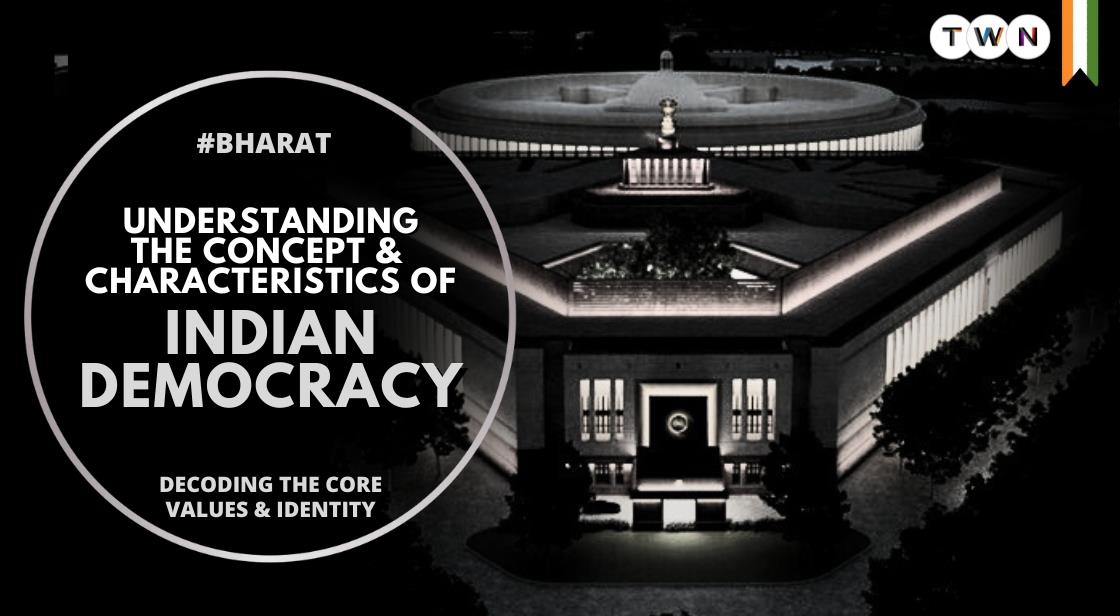Understanding the Concept and Characteristics of Indian Democracy

Blog Post
Embarking on a journey through the intricate tapestry of democracy, our exploration takes us from its conceptual roots to the distinctive characteristics that define it. Focused on the Indian context, this blogpost unravels the layers of democracy, its evolution, and the pivotal role played by the Indian Constitution.
As we delve into the core values shaping Indian democracy, from sovereignty and equality to liberty, justice, fraternity, and secularism, we witness the dynamic interplay that sustains this vibrant form of governance.
As we delve into the multifaceted concept of democracy, we will analyze its evolution, principles, and the intricate dynamics that define the democratic framework in India.
The subsequent sections will unravel the specific features that distinguish democracy in the Indian context, encompassing electoral processes, citizen participation, and the constitutional safeguards that uphold the democratic ethos.
Join us on this insightful journey through the heart of Indian democracy, exploring the intricate interplay between governance, representation, and the collective will of the people.
Democracy, often defined as a government of the people, by the people, and for the people, serves as a fundamental political ideology shaping societies worldwide.
There exist two primary forms of democracy: direct and representative. In a direct democracy, the entire citizenry actively participates in decision-making without relying on elected officials.
Practical within smaller communities or organizations, direct democracy allows members to convene, discuss, and decide collectively through consensus or majority vote. However, the scale and intricacies of modern society limit the feasibility of widespread direct democracy.
In contemporary governance, representative democracy emerges as the prevailing model, where citizens elect officials to enact political decisions, formulate laws, and implement public programs. This system accommodates the complexities of large populations, ranging from municipalities to nations.
The representative democracy we embrace today empowers citizens with the crucial right to vote for their chosen representatives at various levels, including Panchayats, Municipal Boards, State Assemblies, and Parliament.
This exploration focuses on democracy in India, predominantly operating under the tenets of representative democracy. The foundation of Indian democracy lies in its Constitution, a document that not only defines the structure of the government but also safeguards the rights and liberties of its citizens. This Blog post aims to provide a comprehensive overview of democracy in India, shedding light on its distinctive characteristics and the pivotal role played by the Indian Constitution in shaping the nation's democratic landscape.
As we delve into the multifaceted concept of democracy, we will analyze its evolution, principles, and the intricate dynamics that define the democratic framework in India. The subsequent sections will unravel the specific features that distinguish democracy in the Indian context, encompassing electoral processes, citizen participation, and the constitutional safeguards that uphold the democratic ethos.
Join us on this insightful journey through the heart of Indian democracy, exploring the nuances that make it a beacon of justice, equality, and collective empowerment.
The Essential Characteristics of Democracy: A Deeper Dive into Its Characteristics
Democracy, a concept rooted in the empowerment of the people, embodies a set of distinctive characteristics that define its nature and functioning. Beyond the concise list of attributes, delving into the intricate nuances unveils the intricate tapestry that shapes democratic governance.
1. Elected Representatives
At the heart of democracy lies the fundamental principle of representation. Citizens exercise their right to vote, selecting individuals to represent their interests in legislative bodies. This process establishes a direct link between the governed and the governing, forming the cornerstone of democratic governance.
2. Civil Liberties
Democracy thrives in an environment that upholds and safeguards civil liberties. These encompass the individual freedoms and rights bestowed upon citizens, including freedom of speech, expression, assembly, and the right to a fair trial. The preservation of civil liberties is pivotal in fostering an open and participatory society.
3. Organized Opposition Party
A vibrant democracy thrives on the existence of an organized opposition. Opposition parties play a crucial role in providing alternative perspectives, scrutinizing government policies, and ensuring a checks-and-balances system. The presence of a robust opposition contributes to the dynamism and accountability of democratic governance.
4. Independent Judiciary
The autonomy and independence of the judiciary form a vital pillar of democratic systems. An impartial judiciary acts as a safeguard against arbitrary exercise of power, ensuring that legal judgments are based on the principles of justice, equality, and adherence to the constitution. This separation of powers is essential for the maintenance of a just and fair society.
5. Rule of Law
Central to the democratic framework is the adherence to the rule of law. This principle emphasizes that all individuals, including those in positions of authority, are subject to the same set of laws. It ensures that legal processes are transparent, predictable, and applied uniformly, fostering a society where justice prevails over arbitrary decisions.
Delving into the intricacies of these characteristics reveals the intricate interplay that sustains democratic governance. Elected representatives act as conduits of the people's will, civil liberties safeguard individual freedoms, organized opposition ensures a diversity of voices, an independent judiciary upholds justice, and the rule of law establishes the foundation for a society governed by principles rather than capricious authority.
In essence, democracy transcends a mere checklist of attributes; it embodies a dynamic interrelationship between these characteristics, shaping a system that places power in the hands of the people and strives for a more just and equitable society.
Alao Read : Buddhism and the Path to Global Peace: A War-Free World
Unveiling the Foundation of Indian Democracy
To comprehend the roots of modern Indian democracy, one must embark on a journey back to the colonial period, a pivotal epoch that laid the groundwork for transformative changes. The multifaceted alterations brought forth by British colonialism, intentional and unintentional alike, marked a significant juncture in India's historical evolution.
Western education, initially introduced to cultivate a compliant Indian middle class, unexpectedly birthed a cohort that embraced Western liberal ideals—democracy, social justice, and nationalism—to challenge colonial dominion.
The unintended consequences of colonial endeavors illuminate the dynamic nature of Indian democracy. While the British aimed to instill Western education to perpetuate their rule, the emergent Western-educated Indians harnessed these liberal concepts to defy colonial oppression.
It is crucial, however, to dispel the notion that democratic values and institutions are exclusively Western in origin. Ancient Indian epics, folk tales, and diverse narratives spanning the length and breadth of the country abound with dialogues, discussions, and divergent viewpoints. The rich tapestry of Indian culture, manifested in folk tales, riddles, and epics like the Mahabharata, mirrors a tradition of embracing diverse perspectives.
As explored in previous chapters, the trajectory of social change in modern India transcends a binary choice between Indian and Western ideas; it entails a fusion and reinterpretation of both. Social reformers exemplify this synthesis, employing modern notions of equality alongside traditional concepts of justice. The democratic landscape in India is no exception to this nuanced interplay.
Colonial India bore witness to the juxtaposition of undemocratic and discriminatory British administrative practices with the liberating ideals of freedom espoused in Western democratic theories. Western-educated Indians, exposed to these democratic tenets, grappled with a profound question: What does democracy truly entail?
Is it confined merely to political freedom, or does it extend to encompass economic freedom and social justice? The pervasive poverty and intense social discrimination within India prompted a deeper inquiry into the essence of democracy.
The discourse surrounding democracy in India thus transcends the conventional boundaries of political freedom. It ventures into the realms of economic equity and social justice, probing the very foundations of equality—irrespective of caste, creed, race, or gender.
The challenge lies in realizing such equality within the complex fabric of an inherently unequal society. The story of Indian democracy, therefore, unfolds as a synthesis of historical legacies, cultural diversity, and the continuous pursuit of ideals that transcend geographical and temporal confines.
Understanding the Core Values of Indian Democracy
The essence of Indian democracy is encapsulated in a set of core values that act as guiding principles, steering the nation on the path of justice, equality, and fraternity. These values, deeply ingrained in the fabric of the Constitution, are indispensable for the sustenance and flourishing of a democratic society. Let's delve into a comprehensive exploration of these core values that form the bedrock of Indian democracy.
Sovereignty
At the heart of Indian democracy lies the concept of sovereignty, representing the ultimate power vested in the people. This empowers citizens with the right to elect representatives who will govern the nation on their behalf. The electoral process and participatory decision-making mechanisms embody the exercise of this sovereign power, ensuring that the government remains a reflection of the will of the people.
Equality
Equality stands as a fundamental pillar of Indian democracy, emphasizing the equal treatment of all individuals under the law. The Constitution vehemently prohibits discrimination based on factors such as caste, religion, gender, or socioeconomic status. This commitment to equality ensures that every citizen is entitled to the same opportunities and rights, fostering social justice and inclusivity.
Liberty
Liberty, a cherished core value, bestows upon individuals the freedom to express their thoughts, beliefs, and ideas. Protected by the Constitution, freedom of speech, expression, and peaceful assembly empower citizens to actively participate in the democratic process. It serves as a catalyst for citizens to voice their concerns, contribute to public discourse, and hold the government accountable.
Justice
Justice, a cornerstone of Indian democracy, is the bedrock of fair treatment and protection of individual rights. The judiciary plays a pivotal role in upholding justice by interpreting and enforcing laws impartially. It provides a crucial mechanism for dispute resolution and acts as a guardian, ensuring that the rights of citizens are safeguarded.
Fraternity
Fraternity encapsulates the spirit of brotherhood and unity among all citizens, irrespective of diverse backgrounds. This core value emphasizes harmony, tolerance, and respect for varied cultures, religions, and languages. Fraternity fosters a sense of inclusiveness and cooperation, contributing to social cohesion and national integration.
Secularism
Secularism is a foundational principle ensuring that the state maintains neutrality towards all religions. It signifies that the government neither promotes nor favors any specific faith, treating all citizens with equality regardless of their religious beliefs. This commitment to secularism guarantees religious freedom and protects the rights of religious minorities.
These core values collectively form the soul of Indian democracy, shaping its institutions and policies. They reflect the collective aspirations of the Indian populace, steering the nation toward a vibrant, inclusive, and just democratic future.
Conclusion
The exploration of the concept and characteristics of democracy unveils a dynamic and evolving political ideology. From its ancient roots to the complexities of modern governance, democracy has manifested in various forms, with representative democracy taking precedence in today's global landscape.
The Indian democratic journey reflects a fusion of historical legacies, cultural diversity, and a continuous pursuit of ideals that transcend geographical and temporal boundaries.
The core values of Indian democracy, embedded in the Constitution, form the guiding principles steering the nation towards justice, equality, and fraternity. Sovereignty empowers citizens, equality ensures fair treatment, liberty upholds individual freedoms, justice safeguards rights, fraternity fosters unity, and secularism guarantees religious freedom. Together, these values create a vibrant and inclusive democratic framework.
As we navigate through the heart of Indian democracy, it becomes evident that the interplay between governance, representation, and the collective will of the people shapes the nation's political landscape.
The story of Indian democracy is a testament to the resilience of democratic ideals, continually adapting to the evolving needs of society. In this intricate tapestry of democratic principles, the aspirations of the Indian people propel the nation towards a future characterized by justice, inclusivity, and democratic vitality.
You May Like
EDITOR’S CHOICE












